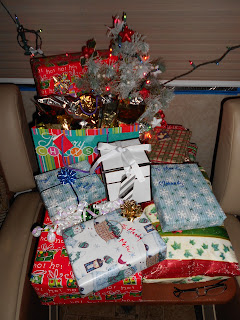Even though Meric and I bought our trailer in January, we didn't move into it until April. So as November approached we got our trailer ready for our first winter living in it. One of the first things we did was "winterize" our water spigot and hose. We got some heat tape and wrapped it around the spigot and along the hose. Then we covered the heat taped hose and spigot with pipe insulation and wrapped the whole thing with duct tape. One particularly cold morning we woke up to no water. We checked the spigot and discovered that a section that the heat tape wasn't touching had froze. After an easy adjustment we fixed the problem. We also covered the spigot with a plastic bag just to help trap some heat around the whole spigot.
We also wrapped some heat tape around some of the hoses housed in the underbelly of the trailer. Our trailer is designed to keep those hoses from freezing by the heat ducts that run along next to them. When the weather is freezing the under belly stays warm as long as we run our propane heat often enough. We have a fireplace electric heater in the back section and a portable electric heater that help heat the trailer, but we keep them on low so that the propane heat will still turn on from time to time. Between the electric heaters and the propane furnace, we stay pretty toasty inside.
Since the weather has turned colder I also like to heat the house by cooking more. The oven like the furnace runs off of propane. Our trailer comes equipped with two 30 lbs tanks for propane.
 |
| 30 lbs is equal to about 7 gallons of propane |
Heading into winter Meric and I knew we would start going through propane a lot faster than we had been. Since April we had only used about one and a half of our tanks. We asked the campground owner were the closest place was to get our tanks filled and after she told us she also told us about a local propane company. She told us that for $50 and the cost of propane they would rent to us a 100 gallon tank and keep it full for us. We got the tank installed just before Thanksgiving and have used about half the tank so far. It has been really nice to not have to make several trips to get our tanks filled. It has also been nice to not worry about running out of propane.
Another thing about propane is that it is a moist heat. Also, cold weather plus trailer living equal condensation. Even though we were aware that condensation is a product of wintering in a trailer we were not fully prepare for how much condensation there would be and all of the issues that come with it. We were starting to find mold and puddles of water around the window sills. At the beginning of the winter there was a period of time where everything just seemed damp. We have found a few solutions that seem to help.
1. Shrink wrap/bubble wrap over the windows: Some trailers come with dual paned windows. This is a great feature because it decreases the amount of condensation greatly. Our trailer doesn't have this feature. I got some shrink wrap to put around the windows. It works okay but the tape doesn't stay 100% and it isn't easy to put on all of my windows because the blinds get in the way. So I got some bubble wrap and covered some of my windows with that. It doesn't look as nice but they both serve the purpose of creating an extra barrier between the warm inside and cold outside.
 |
| You can kinda see the shrink wrap plastic on the top window and totally see the bubble wrap on the bottom. |
2. Dehumidifiers: Towards the beginning of the winter we bought a small dehumidifier. It worked great but after a while we realized we needed another one, a bigger one. Now we have two, the small one for the bedroom and the larger one for the living room. They are quiet, don't take up a lot of space, are easy to empty and work great.
3. Damp Rid: The dehumidifiers help but there are some nooks and crannies that need more to get rid of the condensation. We use Damp Rid products to help that extra little bit. There are several option to choose from too. For the closets they have hanging bags that collect moisture. There are also little packets and bucket type containers to draw in extra moisture.
4. Keeping things open: Even with all of these measures there is still some condensation to deal with. Ventilation is important. We keep our closets open and a few cabinets too. Also we keep our ceiling vents cracked. It seems a little counterproductive with it being cold outside, but it works well and we stay plenty warm.
All of these measures have helped us survive our first winter in the trailer. Winter isn't over yet but we have gotten a good handle on the issues cold weather provides. We have learned a lot and continue to learn better ways of doing things.






